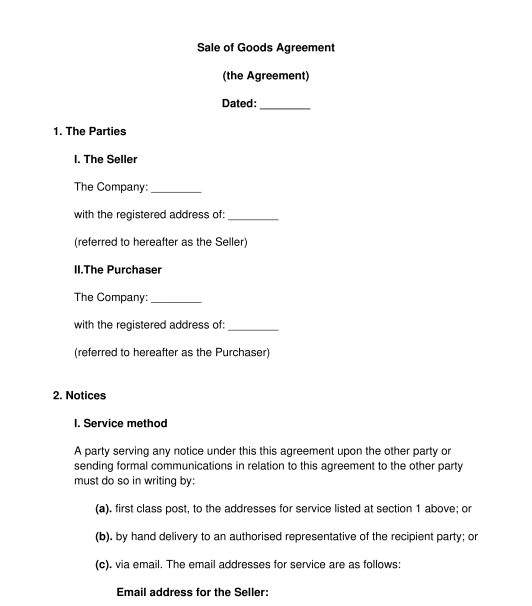 04/11/2025
04/11/2025

Answer a few questions and your document is created automatically.

Your document is ready! You will receive it in Word and PDF formats. You will be able to modify it.

 04/11/2025
04/11/2025
 Word and PDF
Word and PDF
 13 to 19 pages
13 to 19 pages



A sale of goods agreement is used to define a commercial arrangement for the sale and purchase of goods. Both parties to the sale of goods agreement should be established in England and Wales and be acting in the course of business.
A sale of goods agreement can be:
The supply of goods agreement can be used to supply goods to a party on a made-to-order basis. This means that the purchaser will request the manufacture of the goods and the seller will manufacture these for purchase.
A sale of goods agreement can be used for ready-made goods. The sale goods agreement will include a schedule of goods that will be available for purchase - similar to a catalogue.
A sale of goods agreement deals with the sale of goods (physical objects) only. Examples of goods are:
A services agreement deals with the provision of services. A service refers to an action that will be completed under an agreement. For example, this might include:
No. It is possible to reach a verbal agreement about the sale of goods. However, it is best practice to set the agreement out in writing so that each party has a clear understanding of their obligations.
The word title refers to the ownership of the goods. The word risk refers to the responsibility for the goods (i.e. which party bears the risk if the goods are lost or damaged).
A sale of goods agreement will deal with the transfer of title and risk. Usually, this will transfer to the purchaser either:
The sale of goods agreement should also not be used to sell goods to consumers*. A different type of agreement should be used for consumer sales.
It is not possible to exclude certain types of liability* in a sale of goods agreement. In particular, it is not possible to exclude liability for the following:
Liability means the legal responsibility of a party for something. If a party's liability is successfully excluded in relation to a particular issue, this means that they will have no legal obligations concerning that matter, including no requirement to pay legal damages.
A consumer is an individual who purchases goods or services from a business for personal use. Consumers have certain rights and protections.
Discussions and negotiations will generally have taken place prior to the sale of goods agreement commencing. The seller may wish to make use of a letter of intent when making an offer or discussing the proposed terms.
Both of the parties to the agreement must be acting in the course of business because this is a commercial (B2B) agreement. The parties will therefore be either:
A sale of goods agreement can be agreed for a fixed term that will either automatically terminate or a fixed term that will automatically renew.
The agreement will contain termination provisions to explain how the agreement may be terminated before the end of a fixed term.
Once the agreement has been completed, it must be signed. The agreement takes the form of a simple written contract and therefore should be signed as a contract in accordance with the business structure of each of the parties.
The seller should ensure that a schedule is attached to the agreement to list and describe the relevant goods.
The seller may also wish to attach an order pro forma (a template which may be used to place an order).
If one party breaches the terms of an agreement the other party may wish to:
A sale of goods agreement should include the following key information to confirm:
The following key legal provisions will be relevant to a sale of goods agreement:
You fill out a form. The document is created before your eyes as you respond to the questions.
At the end, you receive it in Word and PDF formats. You can modify it and reuse it.
A guide to help you: Signing Documents in England and Wales
Sale of Goods Agreement - Template - Word & PDF
Country: United Kingdom